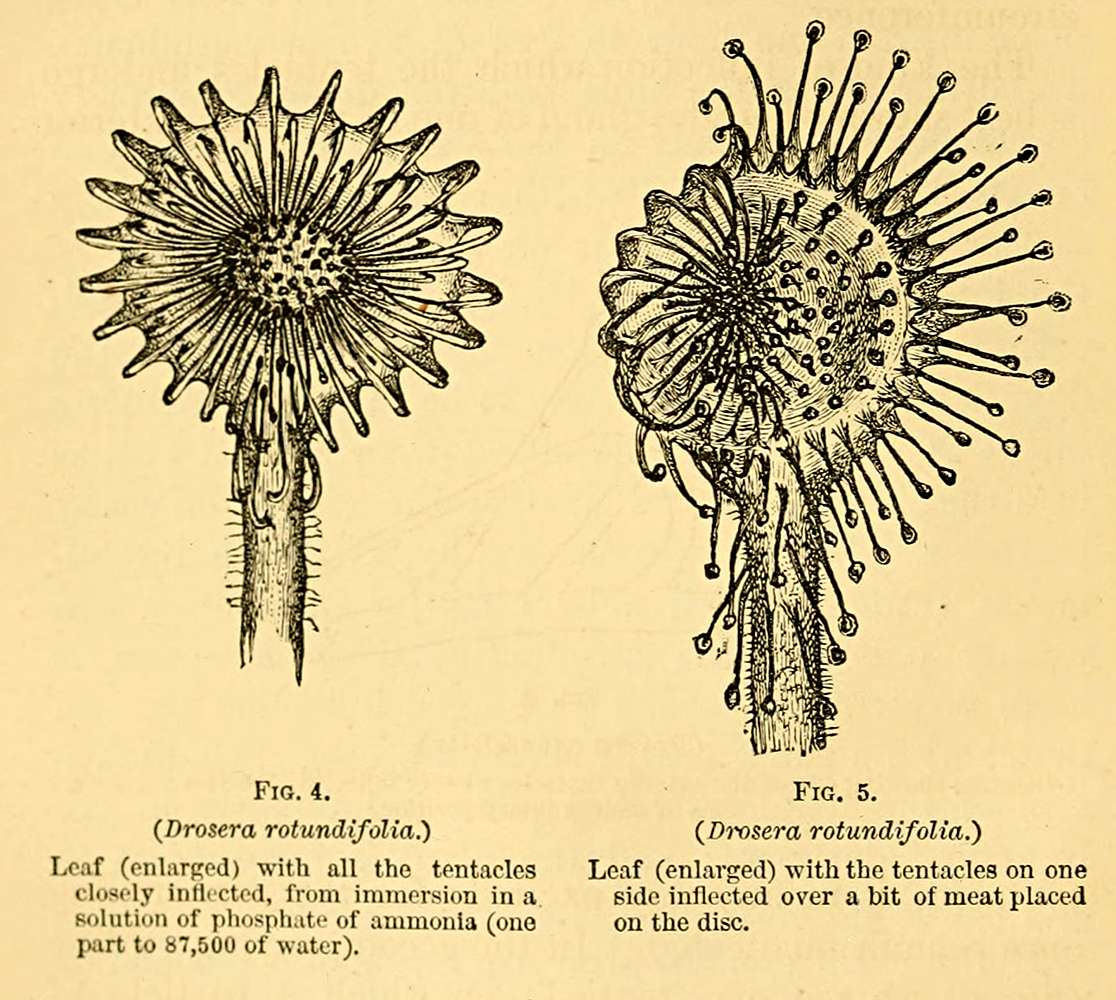To celebrate the 158th anniversary of the publication of Origin of species on 24 November, the full transcripts and footnotes of over 500 letters from and to Charles Darwin in 1873 are now available online. We have also added a page debunking some common myths and misconceptions about Darwin's life and work, where you can find out that Darwin did not introduce the term 'survival of the fittest' and he was not a stuffy father or an atheist.
Here are some highlights from Darwin's correspondence in 1873:
I do not think any discovery ever gave me more pleasure than proving a true act of digestion in Drosera. (Letter to J. D. Hooker, 23 October [1873])
In 1873, Darwin continued work on insectivorous plants, concentrating on 'the most wonderful plant in the world', Drosera (the sundew), and its digestive processes. His exhaustive experiments were documented in Insectivorous plants, published in 1875. Investigating the sundew's sensitivity, Darwin found that the glandular hairs on the leaves responded to slight pressure and minute quantities of fluid. Material dropped in the centre caused the outermost tentacles to bend inward, so that the plant closed like a fist. Darwin was fascinated by this transmission of 'motor impulse', which seemed analogous to muscular contraction in animals.
I could give 2 scientific secretaries work to do (Letter to E. A. Darwin, 20 September 1873)
As well as working on insectivorous plants, Darwin was preparing to publish two more books in the near future, Cross and self fertilisation (1876), and Forms of flowers (1877). When he jokingly mentioned his need for staff, his son Francis proposed that he give up his medical career and become Darwin's secretary. This was a useful move for Francis, who collaborated with his father in his botanical work, and later became university lecturer and then reader in botany at Cambridge University.
Did I ever boast to you on the success, as judged by the lowest standard of sale, of my Expression Book— 9000 copies have now been printed off, & most of them sold! (Letter to J. D. Hooker, 12 January [1873])
Expression of the emotions in man and animals had been published in November 1872, and responses continued to flood in. Reviews remarked on the popular nature of the book. Full of observations of infants and anecdotes of zoo animals and family pets, it was judged attractive and entertaining. However, a highly critical review appeared anonymously in the Edinburgh Review in April. Darwin asked one of his Scottish correspondents, George Cupples, who the author might be, adding: 'I hope that this explosion of wrath & contempt has done the poor gentleman, whoever he may be, some good, but I felt it rather hard after wading through so much abuse not to find myself one whit the wiser on any point; for I knew my own ignorance before hand.'
If you could have heard what was said, or could have read what was, as I believe, our inmost thoughts, you would know that we all feel towards you, as we should to an honoured & much loved brother. (Letter to T. H. Huxley, 23 April 1873)
Darwin wrote this to Thomas Henry Huxley, in the hope that he would accept a gift from his friends of £2100. Huxley was overworked and in poor health, and in financial trouble because of a law suit. Darwin, though not in the best of health himself, organised the subscription and with some trepidation informed Huxley of his friends' actions. Fortunately, Huxley was delighted and accepted, and was able to take a long holiday in Europe.
Steadiness; great curiosity about facts, and their meaning; some love of the new and marvellous (Letter to Francis Galton, 28 May 1873)
Darwin was invited to reflect on his own character when his cousin Francis Galton, who was interested in the inheritance of mental traits, sent him a questionnaire. As well as mentioning the traits listed above, Darwin revealingly declared, 'Special talents, none, except for business, as evinced by keeping accounts, being regular in correspondence, and investing money very well; very methodical in my habits.' Francis added to his father's virtues: 'sober, honest & industrious'.



